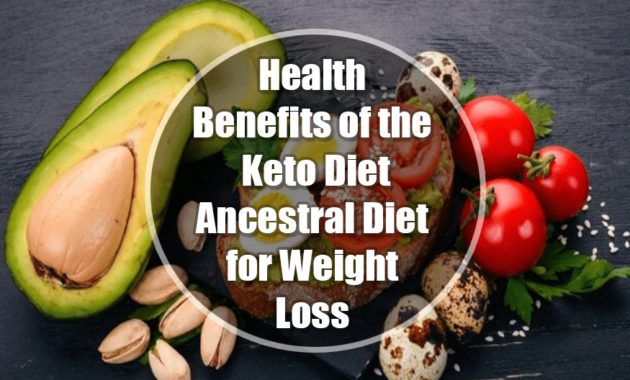For most of humanity’s 2.8 million years on the planet, man has survived on mostly meat and plants. The advent of farming the land to produce grains and carbs, such as rice, potatoes, and wheat, is a relatively new one that began approximately 10,000 years ago when humans moved from being foragers to embracing agriculture. That means humans have survived on a keto diet for most of human history, relying on the proteins and fat from meat and plant nutrients. This partly explains why we all struggle with weight no matter how hard we try.

Benefits of the Keto Diet
Our bodies have evolved to be powered by a specific diet. However, with the introduction of agriculture and farms, we began to rely heavily on glucose to power our bodies. This overreliance on glucose leads to massive weight gain, insulin resistance, inability to lose weight, and other chronic health problems, including diabetes, cancer, hypertension, and even early death. When you are on the keto diet, you are guaranteed to reverse your body’s addiction to glucose and begin to reset your digestive and central nervous systems back to their factory functions. At the same time, there are other benefits to following the keto diet. They are:
- Reduces high blood pressure.
- Reduces inflammation, a significant cause of cancer and other chronic illnesses in the body.
- Helps epilepsy patients by reducing the frequency of their epileptic attacks.
- Reverses prediabetes and diabetes.
- Improves symptoms of polycystic ovary syndrome (PCOS).
- Reduces your blood pressure.
- Reduces the fat in your liver.
- Reduces cholesterol.
- Clears up your skin.
- Provides you with plenty of essential vitamins and minerals.
- Improves mental clarity and day-to-day productivity.
- Reduces hunger.
- Severely reduces and prevents gas and bloating.
- Improves your healing.
- Cheap and easy-to-make recipes using fewer ingredients.
- It uses no processed foods in its recipes, vastly improving your overall health, including brain, gut, organ, and skin health.
- Improves general life expectancy.
Health Benefits of Keto
The keto diet is well-known for helping people lose weight. You are undoubtedly reading this book because you want to know the secrets of losing weight through keto. You will see the benefits above once you lose weight through this diet. The following benefits will also occur in your body:
- Significantly reduces your risk of heart disease and stroke.
- Significantly reduces your risk of gallbladder disease.
- It reduces your risk of depression as well as reduces your symptoms of depression.
- Reduces your risk of complications if you become pregnant.
- Decreases sleep apnea.
People Who Should Avoid The Keto Diet
I am sure you are excited about these excellent health benefits. However, before you begin the keto diet, you must first ensure that you are medically able to follow it without any adverse effects on yourself. The best way to verify if you can do the keto diet is to visit your doctor. Your doctor can assess your medical history to determine if you will be fine on the diet. For others, the keto diet is dangerous. Avoid the keto diet if you are/have:
Pregnant/Breastfeeding:
A pregnant woman needs even more nutrients than usual, so limiting your diet to the keto diet will cause complications for you and your developing baby. Furthermore, you need 2000+ calories as a pregnant woman to power your body and to help your baby grow. It is challenging to meet this amount daily on the keto diet since it cuts out carbs, even healthy whole-grain carbs containing plenty of calories.
Breastfeeding mothers also need to eat as many nutrients each day as possible because those nutrients will pass from the mother onto the baby. The keto diet cuts out some fruits and vegetables, leaving a breastfeeding mother (and her baby) deficient. Likewise, it would help if you had more calories than normal when breastfeeding to produce milk.
On Insulin:
If you manage your diabetes by injecting yourself regularly with Insulin, cutting out carbs significantly may lead to deficient blood glucose levels, leading to further health problems and complications. It would help if you contacted your doctor to determine the best way to begin the keto diet.
A Yo-Yo Dieter:
You may not have the mental capacity to stick with the keto diet if you are used to yo-yo dieting and crash diets. The keto diet will only work if you stick with it long enough to achieve and stay in ketosis over months. If you are used to dieting, giving up, and then taking it back up, you will find it challenging to maintain a state of ketosis over months.
A Family History of Osteoporosis:
Epileptic children who follow a keto diet have shown a greater risk of poor bone health. It is not understood why yet. However, it is best to avoid the keto diet if you have a family history (and therefore a greater chance) of osteoporosis.
IBS or Other Digestive Problems:
The keto diet is low-fiber since it cuts out whole wheat and most whole grains. This can be detrimental if you have digestive problems like chronic constipation or IBS. You also need fiber to keep your gut microbiome fed. The healthy bacteria in your intestines keep you physically and mentally fit. Avoid the keto diet if you are genetically prone to an unhealthy microbiome.
Problems Digesting Fats:
Some people have difficulty digesting fat. You can see how this would be a problem on a fat-dependent diet. You will have problems digesting fats if your gallbladder is surgically removed; you have fatty liver disease; your liver does not produce enough bile to digest the fats you eat; you have blocked bile ducts, causing congested bile. If your doctor thinks the keto diet will be helpful for you, they may be able to prescribe you nutrients that will enable you to digest and absorb fats.



